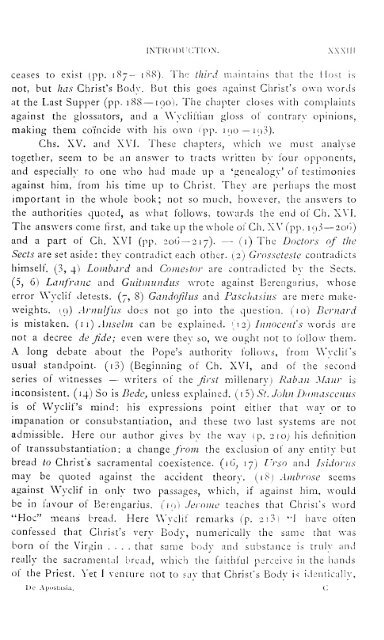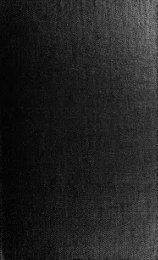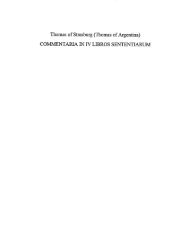Create successful ePaper yourself
Turn your PDF publications into a flip-book with our unique Google optimized e-Paper software.
INTRODUCTION. XXXI II<br />
ceases to exist (pp. 187—188). The third maintains that the Host is<br />
not, but has Christ's Body. But this goes against Christ's own words<br />
at the Last Supper (pp. 188— 190). The chapter closes with complaints<br />
against the glossators, and a Wycliffian gloss of contrary opinions,<br />
making them coinci<strong>de</strong> with his own (pp. 190 — 193).<br />
Chs. XV. and XVI. These chapters, which we must analyse<br />
together, seem to be an answer to tracts written bv four opponents,<br />
and especially to one who had ma<strong>de</strong> up a 'genealogy' of testimonies<br />
against him, from his time up to Christ. They are perhaps the most<br />
important in the whole book; not so much, however, the answers to<br />
the authorities quoted, as what follows, towards the end of Ch. XVI.<br />
The answers come first, and take up the whole of Ch.XV (pp. 193 — 206)<br />
and a part of Ch. XVI (pp. 206 — 217). — (1) The Doctors of the<br />
Sects are set asi<strong>de</strong>: they contradict each other. (2) Grosseteste contradicts<br />
himself. (3, 4) Lombard and Comestor are contradicted by the Sects.<br />
(5, 6) Lanfranc and Guitmundus wrote against Berengarius, whose<br />
error Wyclif <strong>de</strong>tests. (7, 8) Gandofilus and Paschasius are mere make-<br />
weights. (9) Arnulfus does not go into the question. (10) Bernard<br />
is mistaken. 1<br />
( 1) Anselm can be explained. (1 2) Innocent's words are<br />
not a <strong>de</strong>cree <strong>de</strong> fi<strong>de</strong>; even were they so, we ought not to follow them.<br />
A long <strong>de</strong>bate about the Pope's authority follows, from Wyclif's<br />
usual standpoint. (i3) (Beginning of Ch. XVI, and of the second<br />
series of witnesses — writers of the first millenary) Raban Maur is<br />
inconsistent. (14) So is Be<strong>de</strong>, unless explained. (i5) St. John Damascenus<br />
is of Wyclif's mind: his expressions point either that way or to<br />
impanation or consubstantiation, and these two last systems are not<br />
admissible. Here our author gives by the way (p. 210) his <strong>de</strong>finition<br />
of transsubstantiation: a change from the exclusion of any entity but<br />
bread to Christ's sacramental coexistence. (16, 17) Urso and Isidorus<br />
may be quoted against the acci<strong>de</strong>nt theory. (18)<br />
Ambrose seems<br />
against Wyclif in only two passages, which, if against him, would<br />
be in favour of Berengarius. (19) Jerome teaches that Christ's word<br />
"Hoc" means' bread. Here Wyclif remarks (p. 21 3) "I have often<br />
confessed that Christ's very Body, numerically the same that was<br />
born of the Virgin .... that same body and substance is truly and<br />
really the sacramental bread, which the faithful perceive in the hands<br />
of the Priest. Yet I venture not to say that Christ's Body is i<strong>de</strong>ntically,<br />
De Apostasia.<br />
C

















